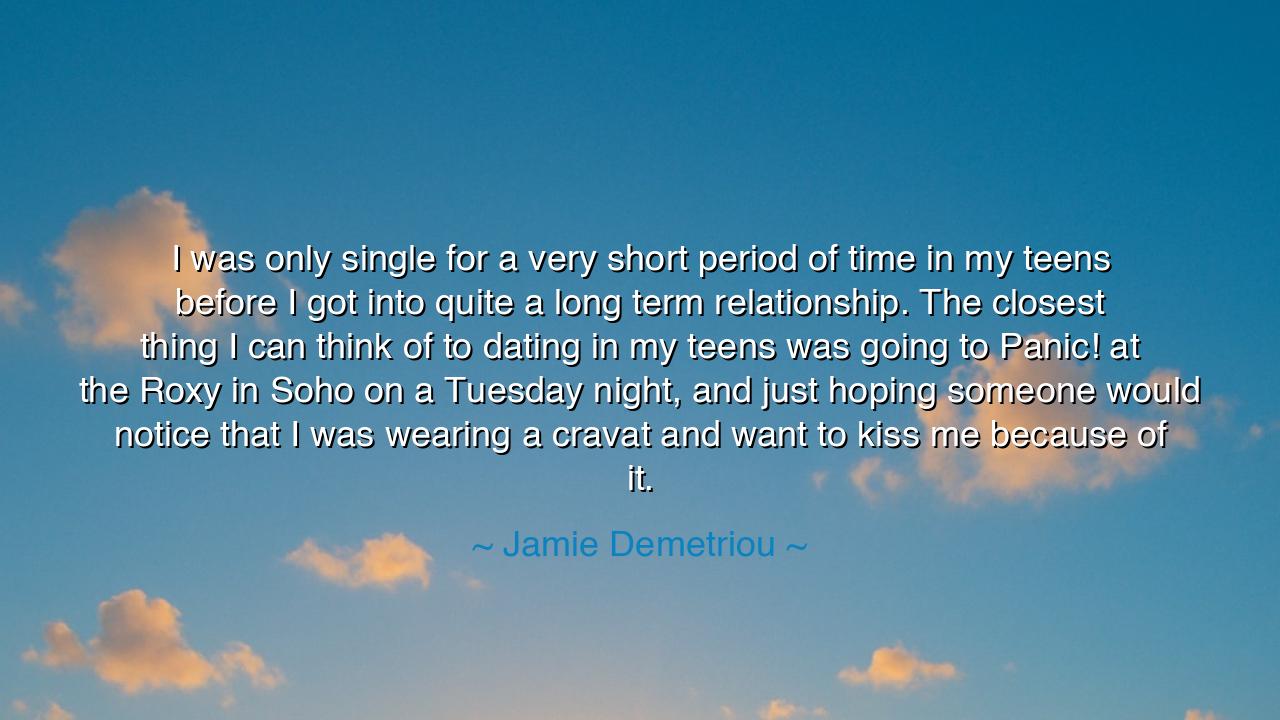
I was only single for a very short period of time in my teens
I was only single for a very short period of time in my teens before I got into quite a long term relationship. The closest thing I can think of to dating in my teens was going to Panic! at the Roxy in Soho on a Tuesday night, and just hoping someone would notice that I was wearing a cravat and want to kiss me because of it.






“I was only single for a very short period of time in my teens before I got into quite a long-term relationship. The closest thing I can think of to dating in my teens was going to Panic! at the Roxy in Soho on a Tuesday night, and just hoping someone would notice that I was wearing a cravat and want to kiss me because of it.” Thus spoke Jamie Demetriou, in jest yet in truth, for in his light-hearted recollection lies a mirror to the human condition: our yearning to be seen, to be understood, to be loved — not for grand deeds or triumphs, but for the small, peculiar things that make us who we are. Beneath the laughter of this memory lies an ancient ache, the same one that stirred the poets of old: the desire to be noticed for one’s essence, one’s spirit, one’s cravat — the chosen symbol of one’s individuality.
In the manner of the ancients, we must not mistake humor for triviality. Demetriou, in his confession of youthful awkwardness, speaks to the universal dance between identity and affection. The cravat is not merely a piece of cloth; it is the banner of self-expression, waved timidly before the indifferent crowds of youth. The young man, standing beneath the neon lights of Soho, hopes that someone — anyone — might look beyond the noise of the world and say, “I see you.” In that hope lies the essence of every human heart since time began. For even the most self-assured among us once stood at the edge of the crowd, half hidden, half glowing, waiting for another soul to turn toward us with recognition.
In the ancient world, this longing was sung by Sappho, whispered by Ovid, and sculpted into marble by the hands of lovers who had no words left. They too adorned themselves — not with cravats, but with garlands, perfume, or verse — seeking that divine spark of connection. To wish to be loved for one’s uniqueness is not vanity; it is the soul’s call for companionship. The cravat at the Roxy, like the laurel crown of Apollo or the ink of a poet’s quill, becomes a symbol of that eternal human gesture: the offering of the self, hoping another will find beauty in it.
Yet there is another layer to Demetriou’s words — one of gentle irony. He laughs at his younger self, at the solemnity with which youth performs its rituals of attraction. This self-awareness is wisdom disguised as comedy. For he reveals that much of our striving in love is both sincere and foolish, heroic and ridiculous. We adorn ourselves with symbols — with clothes, with words, with gestures — believing they will unlock the gates of intimacy. But






AAdministratorAdministrator
Welcome, honored guests. Please leave a comment, we will respond soon